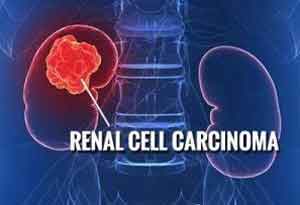- Home
- Editorial
- News
- Practice Guidelines
- Anesthesiology Guidelines
- Cancer Guidelines
- Cardiac Sciences Guidelines
- Critical Care Guidelines
- Dentistry Guidelines
- Dermatology Guidelines
- Diabetes and Endo Guidelines
- Diagnostics Guidelines
- ENT Guidelines
- Featured Practice Guidelines
- Gastroenterology Guidelines
- Geriatrics Guidelines
- Medicine Guidelines
- Nephrology Guidelines
- Neurosciences Guidelines
- Obs and Gynae Guidelines
- Ophthalmology Guidelines
- Orthopaedics Guidelines
- Paediatrics Guidelines
- Psychiatry Guidelines
- Pulmonology Guidelines
- Radiology Guidelines
- Surgery Guidelines
- Urology Guidelines
FDA approves Sunitinib malate for reduction of risk of kidney cancer after nepherectomy

The U.S. Food and Drug Administration approved Sutent (sunitinib malate) for the adjuvant treatment of adult patients who are at a high risk of kidney cancer (renal cell carcinoma) returning after a kidney has been removed (nephrectomy). Adjuvant treatment is a form of therapy that is taken after an initial surgical removal to lower the risk of cancer coming back.
“This is the first adjuvant treatment approved for patients with renal cell carcinoma, which is significant because patients with this disease who have a nephrectomy are often at high risk of the cancer returning,” said Richard Pazdur, M.D., director of the FDA’s Oncology Center of Excellence and acting director of the Office of Hematology and Oncology Products in the FDA’s Center for Drug Evaluation and Research. “There is now an approved therapy for patients who previously did not have options to potentially reduce cancer recurrence.”
The National Cancer Institute (NCI) at the National Institutes of Health estimates approximately 63,990 patients will be diagnosed with kidney and renal cell pelvis cancer this year, and 14,440 will die of the disease.
Sutent is a kinase inhibitor that works by blocking several enzymes that promote cell growth. Sutent was first approved in 2006 for the treatment of certain patients with gastrointestinal stromal tumors and advanced renal cell carcinoma. It is also approved for patients with a certain type of pancreatic cancer.
The approval of Sutent for the adjuvant treatment of renal cell carcinoma was based on a randomized trial of 615 patients with high risk of recurrent renal cell carcinoma following nephrectomy. The study measured the amount of time after the start of the trial that it took for cancer to come back, for the patient to develop another unrelated cancer, or for death to occur from any cause (disease-free survival). After five years, 59.3 percent of patients treated with Sutent had not experienced cancer recurrence or death compared with 51.3 percent of patients receiving placebo.
Common side effects of Sutent include fatigue, diarrhea, inflammation of the mucous membranes and inside the mouth (mucositis/stomatitis), nausea, decreased appetite/anorexia, vomiting, abdominal pain, skin reactions on the hands and feet (hand-foot syndrome), high blood pressure (hypertension), bleeding events, altered taste (dysgeusia), indigestion (dyspepsia) and low levels of blood platelets (thrombocytopenia).
Severe side effects of Sutent include severe liver damage (hepatotoxicity), heart failure (low left ventricular ejection fraction), heart attack (myocardial ischemia/infarction), abnormal health rhythm (prolonged QT intervals/Torsade de Pointes), hypertension, bleeding (hemorrhagic events), metabolic abnormalities due to breakdown of the tumor (tumor lysis syndrome), blood vessel abnormalities leading to blood clots in the small blood vessels resulting in low platelet counts and organ dysfunction (thrombotic microangiopathy, including thrombotic thrombocytopenic purpura and hemolytic uremic syndrome), high levels of protein in the urine (proteinuria), thyroid dysfunction, low blood sugar (hypoglycemia), breakdown of the bone of the jaw due to loss of blood supply (osteonecrosis), and wound healing complications. Patients should stop taking Sutent if serious skin reactions occur (necrotizing fasciitis, erythema multiforme, Stevens-Johnson syndrome or toxic epidermal necrolysis). Women who are pregnant should not take Sutent because it may cause harm to a developing fetus.
The labeling for Sutent contains a boxed warning to alert healthcare professionals and patients about the risk of severe liver damage (hepatoxicity), which may result in liver failure or death.
The FDA granted the approval of Sutent to Pfizer Inc.

Disclaimer: This site is primarily intended for healthcare professionals. Any content/information on this website does not replace the advice of medical and/or health professionals and should not be construed as medical/diagnostic advice/endorsement or prescription. Use of this site is subject to our terms of use, privacy policy, advertisement policy. © 2020 Minerva Medical Treatment Pvt Ltd